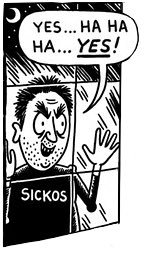When Ksenia Coffman started editing Wikipedia, she was like a tourist in Buenos Aires in the 1950s. She came to learn the tango, admire the architecture, sip maté. She didn’t know there was a Nazi problem. But Coffman, who was born in Soviet-era Russia and lives in Silicon Valley, is an intensely observant traveler. As she link-hopped through articles about the Second World War, one of her favorite subjects, she saw what seemed like a concerted effort to look the other way about Germany’s wartime atrocities.
Coffman can’t recall exactly when her concern set in. Maybe it was when she read the article about the SS, the Nazi Party’s paramilitary, which included images that felt to her like glamour shots—action-man officers admiring maps, going on parade, all sorts of “very visually disturbing” stuff. Or maybe it was when she clicked through some of the pages about German tank gunners, flying aces, and medal winners. There were hundreds of them, and the men’s impressive kill counts and youthful derring-do always seemed to exist outside the genocidal Nazi cause. What was going on here? Wikipedia was supposed to be all about consensus. Wasn’t there consensus on, you know, Hitler?
A typical person might have thought, Something is wrong on the internet again. What a bummer. Next tab. But Coffman is the person who finishes the thousand-page Holocaust novel. Whatever she chooses to spend her time on—powerlifting, fragrance collecting, denazification—she approaches the assignment like a straight-A student. You can time-travel back and watch her begin. Wikipedia never forgets; it keeps a permanent public record of every change an editor makes.
In early November 2015, you will find K.e.coffman in “20 July plot,” an article about the failed plan by German officers to assassinate Hitler. A sentence has jumped out at her. It says that some of the conspirators came to see the plot as “a grand, if futile gesture” that would save “the honour of themselves, their families, the army and Germany.” The claim isn’t supported by any sources. It’s conjecture, hearsay. And to her it seems strangely flattering.
Coffman navigates over to the Wikipedia article about one of the conspirators—Arthur Nebe, a high-ranking member of the SS. Apart from his role in the plot, Nebe’s main claim to notability is that he came up with the idea of turning vans into mobile gas chambers by piping in exhaust fumes. The article acknowledges both of these facts, along with the detail that Nebe tested his system on the mentally ill. But it also says that he worked to “reduce the atrocities committed,” going so far as to give his bloodthirsty superiors inflated death totals.
Coffman will recall that she feels “totally disoriented.” She cannot believe that an innovator in mass murder would have tried to protect the Jews and other supposed subhumans his troops rounded up. She checks the footnotes. The claim is attributed to War of Extermination, a compendium of academic essays originally published in 1995.
Coffman knows the book is legit, because she happens to have a copy on loan from the library. When she goes to the cited page, she finds a paragraph that appears to confirm all the Wikipedia article’s wild claims. But then she reads the first sentence of the next paragraph: “This is, of course, nonsense.”
The level of bad faith is eye-opening for Coffman. She is “very appalled.” She sees that her confidence in Wikipedia was “very much misplaced.” All it takes to warp historical memory, she realizes, is something this small, achievable for almost anyone with a keyboard. “So few people can have so much impact, it’s a little scary,” she says. She begins to turn a more critical eye to what she sees on Wikipedia. Especially the footnotes.
[contd...]
She removes biased sources and any information based on those sources. When she is done, typically, there is nothing left to the article—nothing to say about the person—other than the fact that he won an award. She then insists that an award isn’t reason enough for a stand-alone Wikipedia article. Without a reliable source telling your life story, you can’t be notable. Poof. Another Nazi legend bites the dust.
:rosa-salute:
This woman is a literal hero.
Coffman knows the book is legit, because she happens to have a copy on loan from the library. When she goes to the cited page, she finds a paragraph that appears to confirm all the Wikipedia article’s wild claims. But then she reads the first sentence of the next paragraph: “This is, of course, nonsense.”
Shit like this is really hard to catch unless you have the book or the book is available online. Atleast with website sources you can check out that the site is usually some literal nazi fansite with no legit sources on them. :sankara-salute: to this lady.
It's phenomenal.
"The atomic unit of propaganda isn't lies, it's emphasis."
:citations-needed:
Such a shame that books aren't easily accessible online. We should be able to click the citation on Wikipedia and be taken straight to the page cited.
I don't know anything about Wikipedia but I'd join in on a hexbear effort to correct wiki articles
Would be one of the more worthwhile ways of channeling terminally-online energy.
I did some of this kind of stuff back when one of those police murders of innocent black people got big. Fucked up part is I don't even remember which one. But yeah, wikipedia articles get really fascist when that stuff is blowing up, so I spent some time just removing bullshit.
I've noticed similar problems with misquoted sources and completely unsourced claims on various articles related to communism and communist projects, but it's a ton of work to try and even make a dent in the disinformation. And if you get the personal ire of an admin, they'll just start restoring obviously false claims either because it fits their preferred narrative or simply to spite you.
When she goes to the cited page, she finds a paragraph that appears to confirm all the Wikipedia article’s wild claims. But then she reads the first sentence of the next paragraph: “This is, of course, nonsense.”
THE CLASSIC MOVE HOLY SHIT
"Would I say it's a clear and present danger to your free time? No, I'm not gonna say that!"
I noticed this when the article on the occupation of Poland claimed that the Nazi and Soviet occupations were equally brutal to the Poles
fantastic stuff
e. but this is fucking scary. the main villain in this story, very likely a nazi, is a complete titan on the site. they have so much power https://en.wikipedia.org/wiki/User:Peacemaker67
wikipedia power users are such a special type of nerd. Look at all the participation awards!
literally the worst types of nerds are wikipedia nerds
His arguments are literally just baseless whining about censorship because the articles are dogshit and have no basis for existence unless you assume winning a nazi medal is worthy of an individual page.
But Coffman is the person who finishes the thousand-page Holocaust novel. Whatever she chooses to spend her time on—powerlifting, fragrance collecting, denazification—she approaches the assignment like a straight-A student.
I like that, it's a good mental attitude.
It's a good mental attitude, but you have to make sure you point it in the right direction, too.
If this takes precedent, we could perhaps get some anti communist removed
What a fascinating article about an awesome individual.
history is written by the literate, not the victors.
I wonder if the fash wikipedians have struggle sessions over infoboxes?
Oh yeah, wikipedia even still uses incorrect figures for the food shortages in the Holodomor. Same shit where they cite an actual book but then use figures for (IIRC) gourd growth and apply it to all food. Numbers are off by an order of magnitude but it's a protected article and a pleb like me can't fix it.
I did, over a year ago. It's archived now, under "Reason for reduced collection?"









